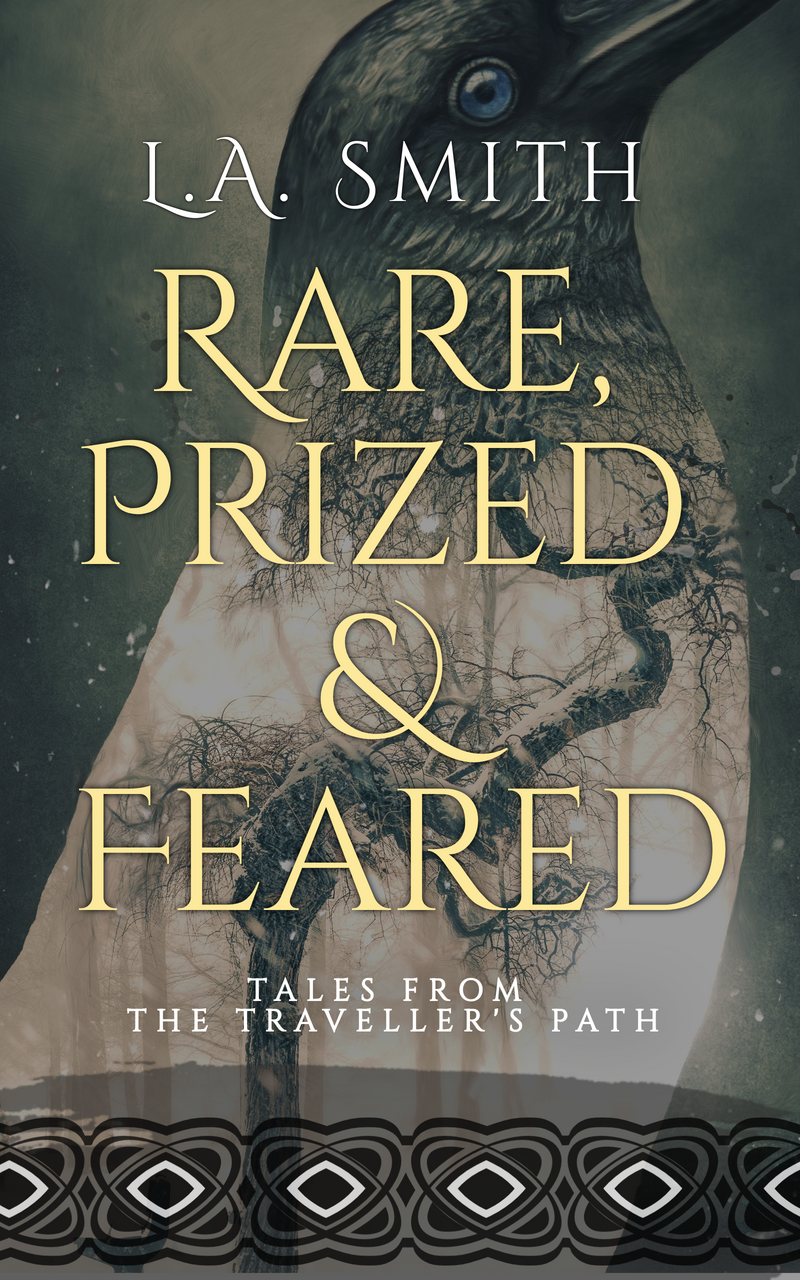
Newsletter
Yes! Send me my FREE short story collection and sign me up for those exclusive subscriber goodies!
We value your privacy, and will never spam you! View our privacy policy at lasmithwriter.com/privacy

Yes! Send me my FREE short story collection and sign me up for those exclusive subscriber goodies!
We value your privacy, and will never spam you! View our privacy policy at lasmithwriter.com/privacy
The Seafarer is one of the Anglo-Saxon poems found in the Exeter Book. We don’t know who exactly wrote it, nor the date that it was composed. The Exeter Book itself dates from the tenth century, so all we know for certain is that the poem comes from that century, or before. Keeping in mind that in general, Anglo-Saxons heard their poetry rather than read it, this poem is likely one that was originally memorized and then recited, possibly with musical accompaniment, as form of entertainment at the mead-hall.
Like The Wife’s Lament and The Wanderer, other poems I have discussed here on the blog, The Seafarer is an elegy – a meditative poem that shares common themes of loneliness, exile, and the passage of time. In other words, it, too, is rather gloomy!
It is written in Anglo-Saxon, of course, which means that it can be tricky to translate. Anglo-Saxon is a “dead” language – no one speaks it now, nor have they for a very long time. And so to translate it is difficult, as there are disagreements about what certain words actually mean. In the poem itself, portions are damaged, making it even more difficult to understand the meaning.
However, enough of it survives, and there is enough general consensus about the translations, that we can get a fairly accurate idea of the broad strokes of what the poem is about.

This is The Seafarer, in the Exeter Book. I never cease to be impressed by the beauty of the uncial writing. If you look carefully, you can see the extra spaces between some of the words, where the reader is meant to pause (see note, below).
It consists of 184 lines of poetry, and is written in the typical Anglo-Saxon alliterative style. Words don’t rhyme, but there is a rhythm to the poem created by having lines of poetry containing the same number of stressed words, pauses between words, and words that begin with the same letter. All of these things make for a pleasant hearing experience.*
The poem begins,
I can make a true song
about me, myself,
tell my travels,
how I often endured days of struggle,
troublesome times,
(how I) have suffered
grim sorrow at heart,
have known in the ship
many worries,
the terrible tossing of the waves
where the anxious night watch
often took me
at the ship’s prow,
tossed near the cliffs.
Now a modern listener/reader might be tempted to tell the bard to just get on with it already, and, by the way, lighten up, but I suspect these opening words would have a different effect on the warrior in the mead-hall.
He would have been given several clues about what he was about to hear from these words, and perhaps from the music that would accompany the poems. The opening line, “I can make a true song about me, myself,” would have been a signal that the tales to follow were ones that the author of the poem (which may or may not be the one reciting it) actually experienced. The word translated here “true song” is the Anglo-Saxon word, soðgied. A gied was a specific type of song, sung by bards in front of an audience. Often these were heroic ballads about the daring deeds of warriors and kings. But any hope our warrior has that this will be that type of song is quickly dashed, as the “me, myself” indicates this will be a song about the speaker/author, not about someone else.
I wonder if the music for these types of songs might be different than what would accompany the recitation of Beowulf, for example. I picture that particular music to be more stirring, to suit the action of the verses. Perhaps the bards would give these mournful elegies a slower, more minor key accompaniment? Who knows?
At any rate, music aside, our warrior-listener has the sense that perhaps this might be a song about love lost, or family forsaken. The words, struggle, troublesome times, endured, sorrow, certainly give him the idea that this is going to get sad. But there’s that intriguing word, travel to perk him up a bit. Who doesn’t love a good story about a difficult journey, especially if the person triumphs at the end, even if the way there is hard?
Well, our warrior won’t be disappointed. This poem is pretty much like that. It tells the tale of the seafarer, describing his journeys alone on the cold sea in the middle of winter, picturing all those on land enjoying a night in the mead hall with friends and family while he’s in the cold, all alone.

A stormy sea at Coldingham Bay, St. Abbs, Scotland. Photo by Walter Baxter, at geograph.org.uk
But unfortunately our warrior will not get much description of foreign places other than that. This poem is really more about the journey, not the destination itself.
There are hints that the reason why the seafarer wanders the seas, far from hearth and kin, is that he is an exile. This echoes The Wife’s Lament. There’s also the hint that even when the seafarer is on land, and spring is coming, he longs for the life at sea. No pleasing him, in other words.
The Anglo-Saxon language is full of poetic words called kennings, which are two words put together to give deeper meaning to the concept described. In this poem we get a good example of this. Often the author uses the word whale-road, or whale-path, to describe the sea. What a great picture, no?
This is a mournful poem, full of images of cold, loneliness, and dissatisfaction. But it ends on a brighter note. At the end, after describing his lonesome journeys on the sea, and equally dissatisfying time on land, the seafarer says,
Let us ponder
Where we have our homes
and then think
how we should get thither–
and then we should all strive
that we might go there
to the eternal blessedness
that is a belonging life
in the love of the Lord,
joy in the heavens.
This turn towards contemplating the eternal end of man and the joys to be found in Heaven has caused some debate among scholars. Some feel that the end third of the poem, which includes these Christian elements, was tacked on at a later date. Others argue that it was part of the poem from the beginning. Myself I tend to agree with the latter. I think this is another wonderful picture of the time when the society was teetering between pagan Anglo-Saxon beliefs and the Christian faith. The Seafarer contains elements of both, and it shows how the mindset of the people of the time could easily accommodate both beliefs, at least for awhile.
Some scholars argue that the poem is meant to be an allegory of a person’s life, wandering through a hard world with little to bring them happiness, longing for the ultimate joys of their eternal reward. I suppose that you could make that argument, but I’m not sure that the author set out with that effect in mind. It seems a bit too much of a metaphorical approach for our earthy Anglo-Saxons. Certainly that idea is there, in the closing stanzas. But I tend to think that the poem starts in the concrete and then moves to the “lesson” that the author had in mind. Of course, we don’t really know either way.
I think that our warrior, sitting in the warm, cozy mead hall with a mug of fine ale at hand, would have enjoyed this melancholy tale of loneliness and hardship. It would have given words to emotions he would have had in his own life, if not in the same circumstances as the seafarer, but in others just as lonely and hard in their own way. The ending call to contemplate what might await after death would have been a challenge to pagan and Christian alike.
I imagine the bard would have got a fine round of applause and a few coins thrown his way after this one, don’t you? Although he probably would have had to follow this up with Beowulf, I think!
To read the entire poem and the see the original Anglo-Saxon alongside it, click here.
*Just to give you a better sense of this, here is what the first lines look like, with the pauses included (these pauses are included in the written poem in the Exeter Book, that’s how we know where to put them) :
I can make a true song about me myself,
tell my travels, how I often endured
days of struggle, troublesome times
Can you get a sense of the rhythm of the poem? It’s a bit tricky, as our English words don’t sound the same, nor have the same number of syllables as the Anglo-Saxon ones. The translator here has also tried to include some of the repeated sounds (me myself, tell my travels, troublesome times).
My first novel, the historical fantasy book, Wilding: Book One of the Traveller’s Path, set in 7th century England, is coming in spring of 2019. To be kept up to date on publication news, and to get the first chapter of Wilding, sign up for my newsletter!